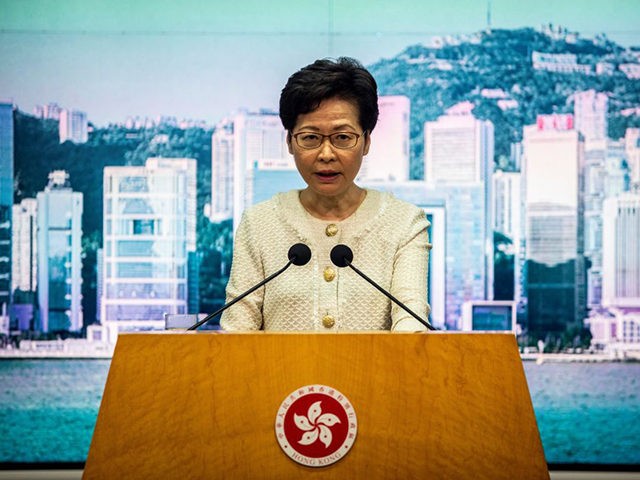China’s handpicked Hong Kong Chief Executive Carrie Lam attempted to reassure residents on Tuesday that the draconian “national security” law Beijing enacted this month, which commands a minimum ten-year prison sentence for anti-government expression, is “relatively mild.”
Lam claimed that most Hong Kong residents support the law, despite thousands protesting it last week, and that the law will allow Hong Kong to “resume her status as one of the safest cities in the world.”
“This National Security Law is actually relatively mild as far as national security laws are concerned,” she claimed.
“The Hong Kong SAR [Special Administrative Region] Government will vigorously implement this law and I forewarn those radicals not to attempt to violate this law or crossing the red line because the consequences of breaching this law are very serious,” Lam said in a statement to reporters on Tuesday. “It only targets a very small minority of people who breach the law. At the same time, it will protect the overwhelming majority of Hong Kong citizens in exercising their legitimate rights and freedoms.”
“I would submit that instead of undermining people’s freedom, the National Security Law will restore stability and help ensure the great majority of Hong Kong people could exercise their rights and freedoms, without being intimidated or attacked,” Lam claimed. “Instead of spreading fear, the law will actually remove fear and let Hong Kong people return to a normal, peaceful life. And Hong Kong will resume her status as one of the safest cities in the world.”
Lam insisted that she had witnessed “an increasing appreciation of the positive effect” of the law among locals, ignoring that thousands took the streets to protest the law after it was enacted — in other words, risking a decade in prison by marching against it.
“Surely this is not doom and gloom for Hong Kong. I’m sure with the passage of time and efforts and the facts being laid out, confidence will grow in ‘One Country, Two Systems’ and in Hong Kong’s future,” Lam said.
“One Country, Two Systems” is the policy that states that Hong Kong cannot declare independence so long as China does not attempt to impose Communist Party law in the region. Opponents of the “national security” law note that, by regulating the speech of people in Hong Kong, the law is illegitimate as it violates “One Country, Two Systems.” Lam parroted the Communist Party argument that the provisions were legal because the behavior it punishes falls under the “defense and foreign affairs” categories which international law widely considers to be under the purview of exercises sovereignty.
The “national security” law criminalizes four types of acts: “secession,” subversion of state power, terrorism, and conspiring with a foreign power. The definitions of these crimes are written deliberately vaguely, but all are punished with between ten years and a lifetime sentence in prison. Anyone present in Hong Kong, not just Hong Kong residents, can be prosecuted under the law.
The enforcement of the law already indicates that its scope will ensnare far more than national security crimes. The first person charged under the law last week was a man found possessing a flag with the words “Hong Kong independence” on it; he faces at least ten years in prison for the “crime.” Another person arrested last week faces a similar fate for publicly celebrating Liverpool’s soccer club winning the 2020 Premier League title. As Liverpool is part of the United Kingdom, police are claiming that his sports fandom is a manifestation of support for the return of the British empire, and thus falls under the “conspiring with a foreign power” crime under the new law.
Hong Kong officials have warned that saying certain slogans associated with anti-China protests, like the now-iconic “Liberate Hong Kong, Revolution of Our Times,” can land a person in prison for at least a decade.
Hong Kong, the largest bastion of capitalism in China before the law passed, has suffered a wave of corporate exits in light of its implementation, as international companies fear their employees may be prosecuted or taken hostage on fabricated charges of “foreign interference” simply for being part of a foreign enterprise. Communist Party officials and Chinese state propaganda have shrugged off the concern that China’s economy may collapse without a functional Hong Kong economy and Beijing has begun attempting to fill the shoes of global companies with smaller Communist Party corporations.
The move has triggered international alarm in the political sphere as well.
“Basically, what we have now is Hong Kong is being absorbed into what is effectively a great firewall concentration camp, these people — I mean, the people of China are good, hardworking people. They live under the worst Orwellian kind of nightmare you can imagine,” White House Trade Adviser Peter Navarro said this weekend. “And I can tell you this, with this new, brutal law that the Chinese Communist Party passed, there’s going to be thousands of people in Hong Kong who are going to spend the rest of their days effectively in concentration camps.”

COMMENTS
Please let us know if you're having issues with commenting.